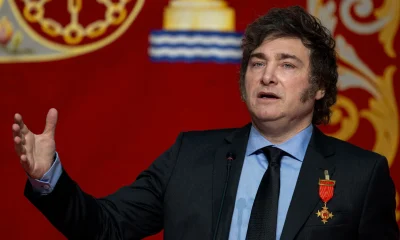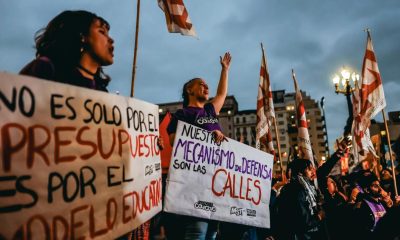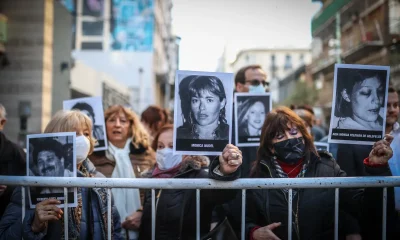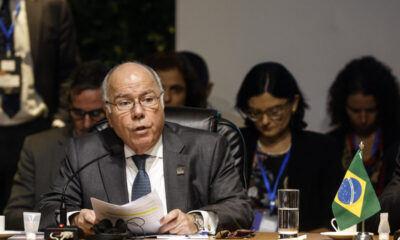International
Milei presents package of laws to Congress on day of demonstrations against him

December 28 |
The President of Argentina, the ultra-liberal Javier Milei, presented this Wednesday to Congress a package of laws, texts which contemplate the deregulation of the economy after the decree approved by the President last week, measures which provoked demonstrations against him and which so far resulted in six arrests.
Convened by the main labor centers, thousands of people gathered in front of the Palace of Tribunals in Buenos Aires to demand that the decree published last week to reform or repeal more than 300 regulations be declared unconstitutional.
“We do not question the legitimacy of President Milei, but we want him to respect the division of powers. Workers have the need to defend their rights when there is an unconstitutionality,” Gerardo Martínez, secretary general of the construction union, one of those who led the demonstration which was also joined by social organizations, told the press.
This initiative will come into force on Friday, within the framework of a strong fiscal adjustment that has already implied a devaluation of the peso of more than 50%.
“We have come to say no to the decree because it takes away one of the powers of the State, the Congress”, said to AFP Adrian Grana, one of the demonstrators for whom the presidential initiative “is a decalogue to favor the powerful to the detriment of the people”.
The demonstration developed peacefully until after midday, when a group of people had small altercations with police officers who were trying to prevent them from closing a street.
Six demonstrators were arrested, according to the press.
The Minister of the Interior, Guillermo Francos, delivered to parliament a draft “omnibus law”, which includes a reform of the electoral system and the tax system, in addition to allowing the privatization of public companies, among other measures.
“We promote these reforms in the name of the May Revolution of 1810 and in defense of the life, liberty and property of Argentines,” Milei wrote in his X account when announcing the legislative project that completes his decree.
Congress opened extraordinary sessions on Tuesday to deal with these laws.
Milei, who took office on December 10 with the promise to reduce State spending, has already announced that he will not renew the contracts of 7,000 public employees.
The President hopes that the adjustment of public spending will reach the equivalent of 5% of the Gross Domestic Product (GDP).
The decree limits the right to strike, modifies labor agreements and the system of severance pay, also repeals laws protecting consumers against abusive price increases when annual inflation exceeds 160% and 40% of the population live in poverty.
“Today we are going to court, but there is another chapter focused on the Congress that will have to give a deep debate” on the content of the decree, said Gerardo Martinez.
The union leader urged the government to “form a collective tripartite dialogue table with employers and unions, as other countries that have gone through a severe adjustment have had”.
The Congress, where the ruling party is the third minority, can invalidate the decree, but this would take several months.
The initiative repeals the retirement mobility law and the law regulating rents, frees the price of bank commissions and punitive rates for debts and allows sports clubs to become corporations.
“It is destructive of all labor rights. The Argentine people elected Milei as president of the Nation, not as emperor,” criticized Martín Lucero, a 45-year-old teacher who came from Rosario to support the march.
Last week the courts opened a file to analyze a collective appeal against the decree.
“All the measures go right through me, they are going to starve us,” said Sofía Julián, a 33-year-old employee who came to the march from the southern outskirts of Buenos Aires. “We are united and organized and we are going to continue fighting to oppose the decisions taken by this government against the Argentine people,” she added.
International
Deportation flight lands in Venezuela; government denies criminal gang links

A flight carrying 175 Venezuelan migrants deported from the United States arrived in Caracas on Sunday. This marks the third group to return since repatriation flights resumed a week ago, and among them is an alleged member of a criminal organization, according to Venezuelan authorities.
Unlike previous flights operated by the Venezuelan state airline Conviasa, this time, an aircraft from the U.S. airline Eastern landed at Maiquetía Airport, on the outskirts of Caracas, shortly after 2:00 p.m. with the deportees.
Interior Minister Diosdado Cabello, who welcomed the returnees at the airport, stated that the 175 repatriated individuals were coming back “after being subjected, like all Venezuelans, to persecution” and dismissed claims that they belonged to the criminal organization El Tren de Aragua.
However, Cabello confirmed that “for the first time in these flights we have been carrying out, someone of significance wanted by Venezuelan justice has arrived, and he is not from El Tren de Aragua.” Instead, he belongs to a gang operating in the state of Trujillo. The minister did not disclose the individual’s identity or provide details on where he would be taken.
International
Son of journalist José Rubén Zamora condemns father’s return to prison as “illegal”
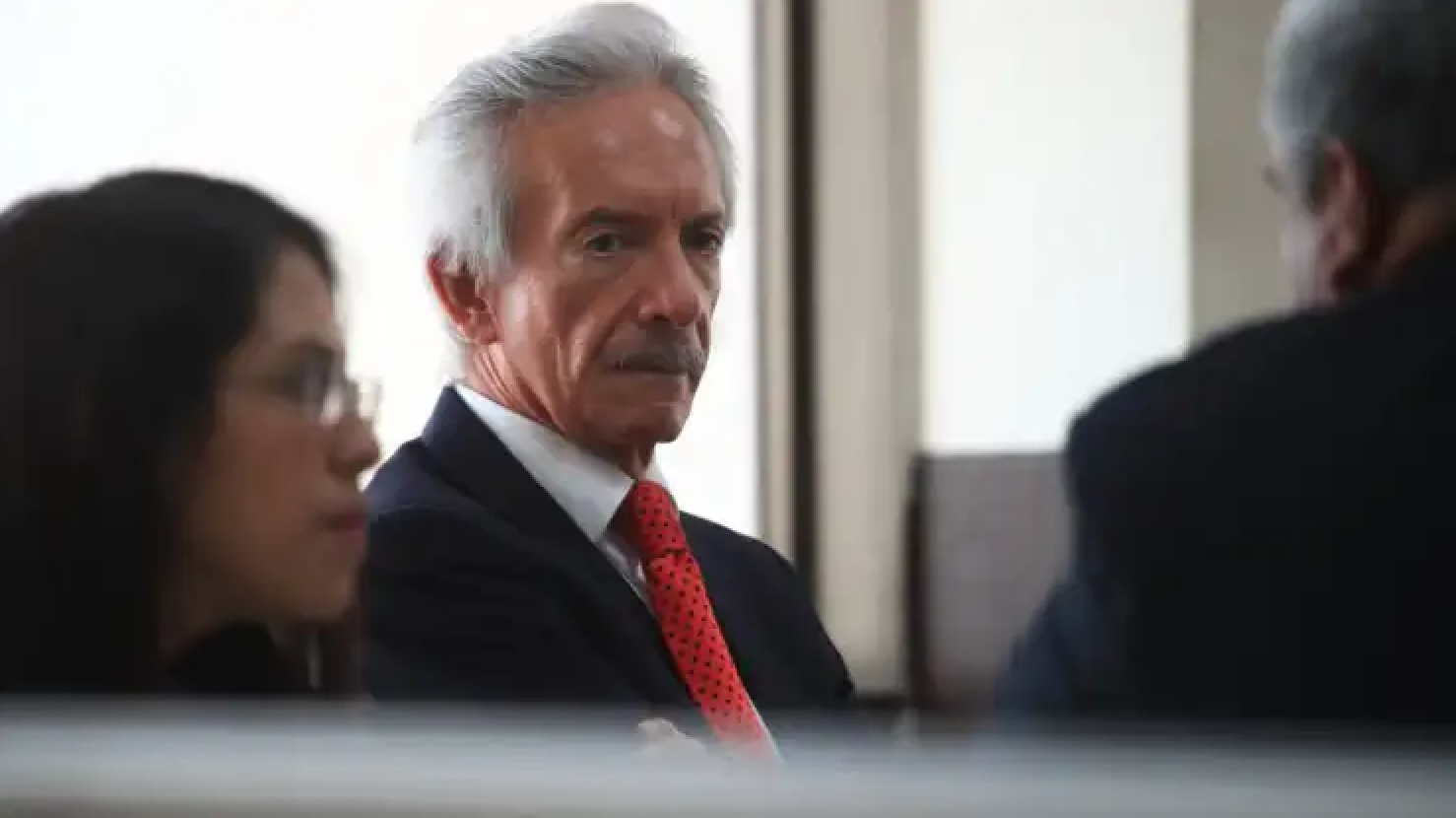
The son of renowned journalist José Rubén Zamora Marroquín, José Carlos Zamora, has denounced as “illegal” the court order that sent his father back to a Guatemalan prison on March 3, after already spending 819 days behind barsover a highly irregular money laundering case.
“My father’s return to prison was based on an arbitrary and illegal ruling. It is also alarming that the judge who had granted him house arrest received threats,” José Carlos Zamora told EFE in an interview on Saturday.
The 67-year-old journalist was sent back to prison inside the Mariscal Zavala military barracks on March 3, when Judge Erick García upheld a Court of Appeals ruling that overturned the house arrest granted to him in October. Zamora had already spent 819 days in prison over an alleged money laundering case.
His son condemned the situation as “unacceptable”, stating that the judge handling the case “cannot do his job in accordance with the law due to threats against his life.”
International
Miyazaki’s style goes viral with AI but at what cost?

This week, you may have noticed that everything—from historical photos and classic movie scenes to internet memes and recent political moments—has been reimagined on social media as Studio Ghibli-style portraits. The trend quickly went viral thanks to ChatGPT and the latest update of OpenAI’s chatbot, released on Tuesday, March 25.
The newest addition to GPT-4o has allowed users to replicate the distinctive artistic style of the legendary Japanese filmmaker and Studio Ghibli co-founder Hayao Miyazaki (My Neighbor Totoro, Spirited Away). “Today is a great day on the internet,” one user declared while sharing popular memes in Ghibli format.
While the trend has captivated users worldwide, it has also highlighted ethical concerns about AI tools trained on copyrighted creative works—and what this means for the livelihoods of human artists.
Not that this concerns OpenAI, the company behind ChatGPT, which has actively encouraged the “Ghiblification”experiments. Its CEO, Sam Altman, even changed his profile picture on the social media platform X to a Ghibli-style portrait.
Miyazaki, now 84 years old, is known for his hand-drawn animation approach and whimsical storytelling. He has long expressed skepticism about AI’s role in animation. His past remarks on AI-generated animation have resurfaced and gone viral again, particularly when he once said he was “utterly disgusted” by an AI demonstration.
-

 International4 days ago
International4 days agoFederal court blocks Trump’s use of Enemy Alien Act for deportations
-

 Central America4 days ago
Central America4 days agoHonduran group in U.S. pushes for voter registration to prevent election fraud
-

 Central America4 days ago
Central America4 days agoKristi Noem in Latin America: Talks with Bukele on expulsions and security policies
-

 International4 days ago
International4 days agoEcuador oil spill worsens as containment dam collapses
-

 Central America3 days ago
Central America3 days agoNicaragua denounces Costa Rica’s position in SICA as aligned with foreign interests
-

 Central America3 days ago
Central America3 days agoNicaragua’s new judicial law consolidates power in Ortega and Murillo’s hands
-

 Central America3 days ago
Central America3 days agoPanama’s president declares Darién gap ‘closed’ amid sharp drop in migrant flow
-

 International3 days ago
International3 days agoMarco Rubio warns Venezuela against military action against Guyana
-

 International1 day ago
International1 day agoSon of journalist José Rubén Zamora condemns father’s return to prison as “illegal”
-

 International1 day ago
International1 day agoMiyazaki’s style goes viral with AI but at what cost?
-

 Central America6 hours ago
Central America6 hours agoPanama police clarifies that Interpol alert for Martinelli is still pending
-

 International6 hours ago
International6 hours agoDeportation flight lands in Venezuela; government denies criminal gang links
-
Central America2 days ago
Nicaragua revokes legal status of 10 more NGOs, bringing total to over 5,600


























